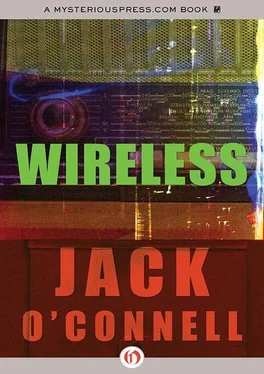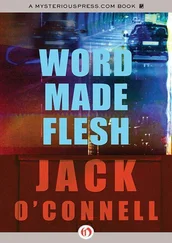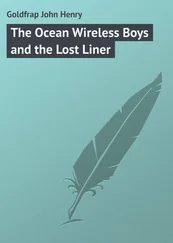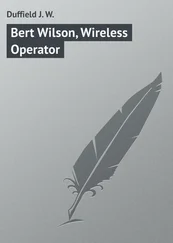He takes his notebook from the passenger seat, opens it, rereads the last few lines of rigid print, then picks up his pen and continues writing.
(Goulden Avenue)
My life continues, Margie. I’m involved in the meat of one of my most annoying investigations. You would say I found them all annoying and that I loved the annoyance. (Maybe in the same way that I used to love the static, what you thought to be blank noise, undefined, incapable of being interpreted.) I don’t disagree with you out of hand. I’m just not sure “love” is the correct word in this instance. Rather, I would say that I am compelled to view “annoyance” as an opponent of complacency. Complacency can be equated with weakness. And weakness will always lead to disorder, confusion, an irreversible breakdown of progress and history.
In this vein, I’d like to attempt to explain my attention to seemingly meaningless static. Though I am still making progress in Dr. Helm’s book (though, to be honest with you, I am having trouble accepting his contention that it is the repression of a “female sensibility,” trapped, hidden, and degraded in every male, that is the cause for everything from harsh words to Cambodian genocide …), I took a look, yesterday, into another tome from the self-help library you had abandoned in our home. I happened to scavenge Dr. Rothstein’s Death Takes No Holiday before moving to my current residence. The doctor goes in for the popular notion that casts Anger as one rung on the inevitable ladder up to an acceptance of Death as a natural (and constantly imminent) state.
Possibly, this is where we differed the most, Margie. I continue to see my anger as an assault on death, an affront to its peasant (communistic) power. And even if I’m forced to admit that, at some point, my defeat (and Death’s victory) is certain, I still have the comfort of the knowledge that I did not bow down to a foe I cannot respect.
A pain begins behind his left eye. He rubs a hand over his face, takes some deep breaths, then slides the notebook and pen under his seat and looks down Goulden Ave. He fixes on a dark-skinned girl, maybe seventeen. He watches her bend down to the window of a slowing low-rider and begin a full-bodied negotiation, a form of barter where suggestion is everything. And the ease of her movements and gestures, the lascivious way she runs her hand along the side of her own breast, tells him yes, these women may be the best and the brightest, but they haven’t got a clue that there’s a ton of granite metaphor easily within their grasp, waiting to be noticed and understood. Cortez’s barren empire of signs flanking their backsides might as well be Notre Dame or Chartres.
Still, he’s not without some degree of sympathy for these women. They’re animals of commerce and at the very least he can understand the rules that drive their lives. There’s an obscene order to their motivations and actions, a primal, logical capitalism played out in a carnal market. And the fact is they never had the benefit of a Sister Bernadette, Speer’s first-grade teacher, with her rosary beads cloaked inside the flowing black habit and transformed in an unseen instant into a flailing whip, a blessed lash that could beat the commandments forever into a still-forming skull.
He leans forward and pops the glove box and for a second he stops and stares at his hand lit in the dim green glow that emits from the band selector of the dash radio. His skin looks gray and then almost translucent, as if, if he continued to stare, he’d see through the skin to the muscle and bone below. He blinks his eyes and pulls from the box a pint of Four Roses and a warm can of Jolt. He pops open the soda and takes a long drink, wedges it in his crotch, twists off the top of the bourbon, and throws down a shooter’s swallow.
The radio is tuned between stations, and the car is filled with a low, consistent hiss of static. Speer has no idea what time it is. On the drive to Goulden Ave, on impulse, he pulled up next to a sewer grating, unstrapped his Bulova — the one Margie gave him, inscribed All My Love Always —and dropped it down through the slot into a pool beneath the street. He’s not sure why he did this. He could argue with himself that it was a symbolic attempt to begin to move on, to eliminate reminders of his wife, of the woman he long ago invested his soul with. But the truth is he has no desire to forget Margie. To stop writing the letters. To abandon his plans for reconstructing their life together.
There’s a small silver crucifix dangling from the rearview mirror in the center of the windshield. Speer lifts his hand to it, recoils his index finger, then tweaks the cross lightly. It begins to sway back and forth through his line of vision like a pendulum, and with each arc Speer shifts his field of focus from the dying Christ to the clan of whores jabbering a hundred yards away. The process makes his head ache worse, but he keeps it up for a time, and then, without really thinking, he begins to recite a Bible verse drilled into him long ago by Sister Bernadette, words pushed down into the densest meat of his brain, where they could never evaporate.
Do not defile yourself by any of these things, for by all these the nations I am casting out before you defiled themselves; and the land became defiled, so that I punished its iniquity, and the land vomited out its inhabitants …
The words trail off, but he continues to move his lips for a while, a silent babble, an inaudible glossolalia, as if a mute tongue of purging fire had visited this Ford sedan parked at the side of Goulden Ave. When he finally brings his lips together, he restarts the car’s engine and begins to roll toward the Penumbra.
Steam is rising from the sewer gratings along Goulden and it combines with a low layer of damp fog to give the whole street. a different look, as if the block had been lifted out of Quinsigamond and transported to Berlin in 1931, all shadow and harsh electrical light against red brick and iron beams and whining, distant police sirens chronically sounding in the distance.
Mina is the first to approach Speer’s car. She’s small and a little wiry, dressed in a red vinyl miniskirt, sheer black stockings with a polka-dot design woven in, a shiny, royal-blue halter top under a ratty imitation-fur shoulder wrap. Her hair is a weird retro shag cut with the last traces of a burnt-red dye job growing out. She moves across the sidewalk at a slow pace, a true saunter, to the accompaniment of accented calls from her colleagues. Speer picks up a mention of señorito blanquito . He slides the passenger window down all the way and as Mina leans down on the door and smiles, he toasts her with his pint and says, “The kingdom of heaven approaches.”
“Your lucky night,” Mina says. “This kingdom has the discount for un policía .”
Speer doesn’t even try to protest.
“I’m off duty and very lonely,” he says in a low and awkward voice, feeling a run of sweat slide down the middle of his back.
“Let’s see how lonely,” she says, rubbing her thumb and forefinger together in the classic cash sign and looking backward over her shoulder at the sisters who continue to hoot and laugh and sing.
Speer slides a wad of bills up slightly from his breast pocket and Mina says, “You have a date for the prom, policía ,” and climbs in the car next to him.
They enter the basement apartment and Speer flips on a light, then goes to the folding table and turns on the radio. As the sound of static plays from the speaker, he moves back to the door, locks the bolt, and secures the slide chain. Mina tosses her throw over the stool, walks to the tiny rectangular window in the far corner of the room, up near the ceiling, and says, “You get water in here?”
Читать дальше












